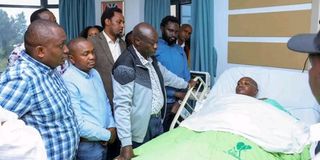Premium
‘Truth’ mismatch between police and public

Former Deputy President Rigathi Gachagua and other political leaders visit Juja MP George Koimburi at Karen Hospital on May 26, 2025.
What you need to know:
- The best way to hedge against the public being swayed through propaganda is gaining a good reputation.
- Good reputation enables the public to doubt negative information whenever it arises, as it often does in politics.
Mr Juma is teaching history in a class of 30 students. He is teaching it so well, but one student sitting nearest to him spots a problem. The teacher’s socks are torn.
During break time, the students discuss Mr Juma. Those who were sitting at the back are wowed by Mr Juma’s teaching skills. But the student who was sitting nearest to him dismisses the teacher as irresponsible on account of the torn socks. The students at the back doubt if indeed Mr Juma was wearing torn socks.
They argue endlessly on how to assess Mr Juma. All parties are correct on facts. But the positioning in the class towards the object (teacher) gives both parties different interpretations of a phenomena.
And that allegory mirrors the mismatch in the construction of facts between the public and police (plus lawyers, judges and all other bureaucrats in the legal sector). A single event can happen, which causes the police to interpret facts in a manner directly opposite the interpretation of the "man in the city bus".
Police interpretation is guided by statutes. Public interpretation is guided by reputation and political perceptions. Take an example of Mathioya Constituency during 1997 elections. Multiparty democracy had been reintroduced in 1992. Kenneth Matiba had swept Murang’a, causing Kanu Secretary General JJ Kamotho to lose his parliamentary bid for Kangema.
Abduction story
On losing in 1992, JJ quipped even a goat would have been elected if it stood on Matiba's Ford Asili party. President Daniel Moi nominated him to Parliament though. He then started to plot a comeback in 1997 and undertook major developments in the constituency and everyone thought Kamotho would win.
To further cement his bid, Moi pushed for Mathioya to be excised from the larger Kangema, creating a smaller constituency of three wards where JJ was facing a little-known candidate known as Maina Njakwe.
On the day of polling, everyone expected JJ would win, only for political propaganda to emerge the very morning of the voting that the Kanu stalwart had almost killed Maina in a campaign rally. It was rumoured Maina's vehicle had been burnt and several aides injured. The public immediately changed its mind and voted for Maina.
Police afterwards investigated the incident and gave a different conclusion. That the alleged chaotic incident was stage-managed. The same year of 1997, Uhuru Kenyatta vied for the Gatundu MP seat against Moses Mwihia. Every pundit placed his bet on Kenyatta.
Two weeks to the elections, Moses disappeared. Rumours swirled around that he had been abducted, and Uhuru lost, largely because of the suspicion that he was involved in the alleged disappearance. Police did their investigations later and doubted the abduction story.
Fast forward to the 2017 Jubilee party nominations. A certain governor was defending his seat. He used to draw huge crowds to his meetings. Two days to the nominations, rumours swept the county like wild fire, including allegations that the governor had told the public to line up in pairs of two like "dogs’ mammary glands". He lost the nominations.
Case of self-abduction
Can one blame the public for believing such stories? The answer is no.
The public generally uses heuristics to make judgement. Heuristics are mental shortcuts, which help people make quick decisions when faced with complex situations. They are simplified mental and cognitive strategies to avoid overthinking. Everyone uses heuristics. For example, if you go to the United States for the first time and get robbed, you refuse to return for a second time describing it as a place full of thieves given your initial experience.
Of course, the best form of reasoning is to get data on crime before concluding if USA is safe or not. But few turn to data to make such judgements.
The best way to hedge against the public being swayed through propaganda is gaining a good reputation. Good reputation enables the public to doubt negative information whenever it arises, as it often does in politics.
The above three examples in politics reflect inability by the impugned candidates to guard their reputation. JJ was a staunch KANU member and the party was known for violence. Maina merely swung in the tide of that reputation. It was the same case with the governor. He had built a reputation as a ferocious character that created seeds for germination of that subsequent propaganda.
The public, therefore, will not delve into facts. They will use reputation to make judgement unlike police.
That explains the current mismatch of views between the police and the public in the case involving Juja MP George Koimburi. While the security agencies insist this was a case of self-abduction, Koimburi’s camp insists otherwise. Will the public believe police? That will depend on the reputation of the police. Robert Greene in his book, 48 Laws of Power states, says so much depends on your reputation. Guard it with your life".
Meanwhile, what if Koimburi says he does not understand this hullabaloo about abduction and states he has not complained to anyone about it? If pressed further about what he was doing at a coffee farm, he could simply retort that he was acting or say he cannot remember what happened. Everything would then collapse, including the parliamentary and police investigation.
Of course, we should not pre-empt his statement. But what if?
Dr Irungu Kangata is the Governor of Murang’a County; Email: [email protected]


